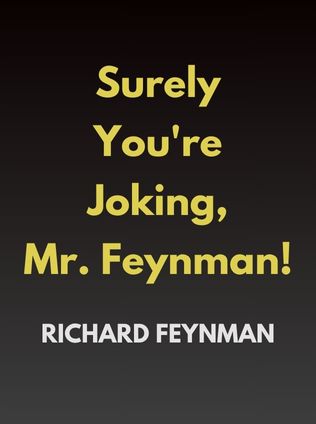
Surely You're Joking, Mr. Feynman!
Adventures of a Curious Character
By Richard Feynman
Published 01/1985
About the Author
Richard Feynman is not just remembered for his groundbreaking contributions to physics; he is celebrated for his curious mind, playful spirit, and boundless enthusiasm for life. Born on May 11, 1918, in New York, Feynman’s journey into the world of science was driven by a deep-seated love of learning and discovery. His academic career began at the Massachusetts Institute of Technology (MIT), where he completed his undergraduate studies before moving on to Princeton University for his Ph.D. During his time at Princeton, Feynman became involved in the Manhattan Project, a pivotal moment in both his life and the world’s history, as this project led to the development of the atomic bomb.
Feynman’s scientific achievements are vast, most notably his contributions to quantum electrodynamics, for which he was awarded the Nobel Prize in 1965. However, Feynman’s life and work extended far beyond these accolades. His memoir, Surely You’re Joking, Mr. Feynman!, captures the essence of his personality—his insatiable curiosity, his penchant for mischief, and his unorthodox approach to both life and science. Feynman’s stories reveal a man who viewed the world through a lens of wonder and humor, always eager to explore the unknown, whether it be through physics, safecracking, or learning to play the drums in a samba band in Brazil.
Throughout his life, Feynman was not just a scientist but also a teacher, artist, and adventurer. He believed in the joy of discovery and the importance of teaching others to see the world in the same curious and questioning way. His legacy continues to inspire new generations of thinkers, reminding us that science is not just about formulas and experiments—it’s about the thrill of finding out how the world works.
Main Idea
The main idea of Surely You’re Joking, Mr. Feynman! is to showcase the multifaceted life of Richard Feynman, highlighting his unique approach to learning, problem-solving, and living. Unlike typical autobiographies, this memoir does not follow a strict chronological order or focus solely on Feynman’s scientific achievements. Instead, it presents a collection of anecdotes that reveal his character, his values, and his philosophy of life. Feynman’s stories demonstrate how intellectual rigor and a sense of play can coexist, leading to both profound discoveries and a fulfilling life.
Table of Contents
- Early Life and Education
- The Manhattan Project
- Teaching and Academia
- Adventures and Curiosities
- The Importance of Play
- Scientific Integrity and Intellectual Honesty
- Feynman’s Legacy
Early Life and Education
Richard Feynman’s early life was characterized by a relentless curiosity and a passion for understanding how things worked. Growing up in New York, Feynman was the kind of child who would take apart radios and other household gadgets just to see if he could put them back together again. This hands-on approach to learning stayed with him throughout his life, influencing his method of scientific inquiry.
At MIT, Feynman’s talents began to shine. He was not just a student of physics; he was a creator, an inventor, and a thinker who approached problems with a fresh perspective. Feynman often spoke of how he developed his own mathematical notations simply because he found the standard ones too cumbersome. His time at Princeton further honed his skills, particularly during his involvement with the Manhattan Project, where he applied his theoretical knowledge to real-world problems with life-and-death consequences.
Feynman’s educational journey was not just about accumulating knowledge—it was about learning to think, to question, and to never be satisfied with the first answer. This mindset would later define his approach to teaching and his interactions with students and colleagues alike.
The Manhattan Project
One of the most significant periods in Feynman’s life was his participation in the Manhattan Project. As a young physicist, Feynman was thrust into a world where the stakes were incredibly high. The development of the atomic bomb was a monumental task that required not just intellectual brilliance but also the ability to solve practical problems under immense pressure.
Sign up for FREE and get access to 1,400+ books summaries.
You May Also Like
The Subtle Art of Not Giving a F*ck
A Counterintuitive Approach to Living a Good Life
By Mark MansonRich Dad Poor Dad
What the Rich Teach Their Kids About Money - That the Poor and Middle Class Do Not!
By Robert T. KiyosakiHow To Win Friends and Influence People
The All-Time Classic Manual Of People Skills
By Dale Carnegie



















